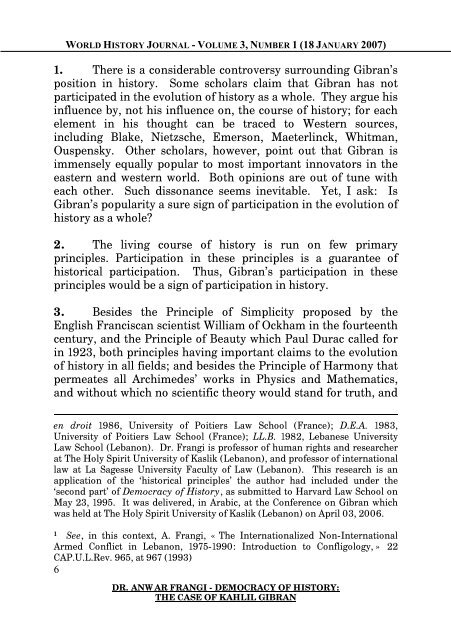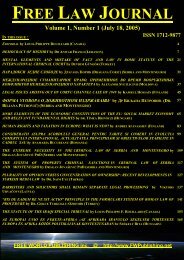by dr. anwar frangi - Free World Publishing Inc.
by dr. anwar frangi - Free World Publishing Inc.
by dr. anwar frangi - Free World Publishing Inc.
- No tags were found...
You also want an ePaper? Increase the reach of your titles
YUMPU automatically turns print PDFs into web optimized ePapers that Google loves.
WORLD HISTORY JOURNAL - VOLUME 3, NUMBER 1 (18 JANUARY 2007)1. There is a considerable controversy surrounding Gibran’sposition in history. Some scholars claim that Gibran has notparticipated in the evolution of history as a whole. They argue hisinfluence <strong>by</strong>, not his influence on, the course of history; for eachelement in his thought can be traced to Western sources,including Blake, Nietzsche, Emerson, Maeterlinck, Whitman,Ouspensky. Other scholars, however, point out that Gibran isimmensely equally popular to most important innovators in theeastern and western world. Both opinions are out of tune witheach other. Such dissonance seems inevitable. Yet, I ask: IsGibran’s popularity a sure sign of participation in the evolution ofhistory as a whole?2. The living course of history is run on few primaryprinciples. Participation in these principles is a guarantee ofhistorical participation. Thus, Gibran’s participation in theseprinciples would be a sign of participation in history.3. Besides the Principle of Simplicity proposed <strong>by</strong> theEnglish Franciscan scientist William of Ockham in the fourteenthcentury, and the Principle of Beauty which Paul Durac called forin 1923, both principles having important claims to the evolutionof history in all fields; and besides the Principle of Harmony thatpermeates all Archimedes’ works in Physics and Mathematics,and without which no scientific theory would stand for truth, anden <strong>dr</strong>oit 1986, University of Poitiers Law School (France); D.E.A. 1983,University of Poitiers Law School (France); LL.B. 1982, Lebanese UniversityLaw School (Lebanon). Dr. Frangi is professor of human rights and researcherat The Holy Spirit University of Kaslik (Lebanon), and professor of internationallaw at La Sagesse University Faculty of Law (Lebanon). This research is anapplication of the ‘historical principles’ the author had included under the‘second part’ of Democracy of History, as submitted to Harvard Law School onMay 23, 1995. It was delivered, in Arabic, at the Conference on Gibran whichwas held at The Holy Spirit University of Kaslik (Lebanon) on April 03, 2006.1See, in this context, A. Frangi, « The Internationalized Non-InternationalArmed Conflict in Lebanon, 1975-1990: Introduction to Confligology, » 22CAP.U.L.Rev. 965, at 967 (1993)6DR. ANWAR FRANGI - DEMOCRACY OF HISTORY:THE CASE OF KAHLIL GIBRAN
















